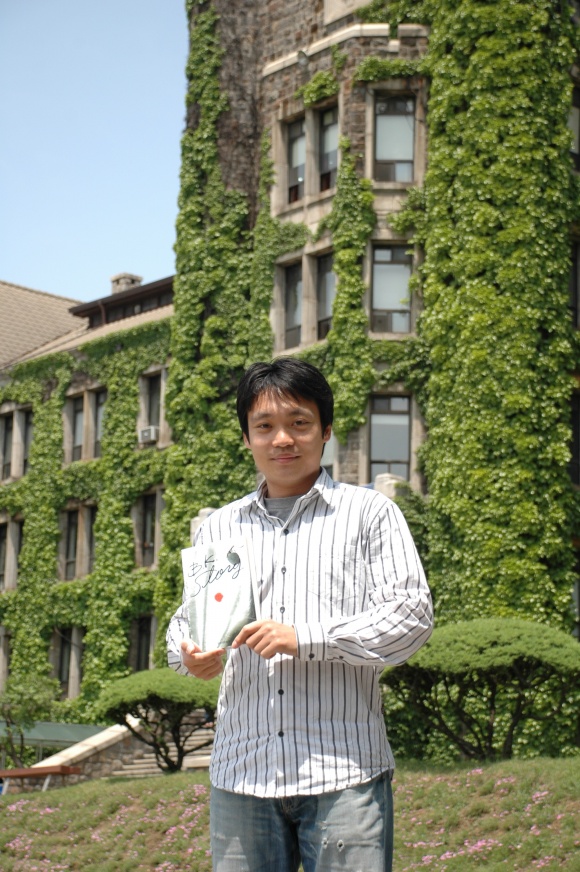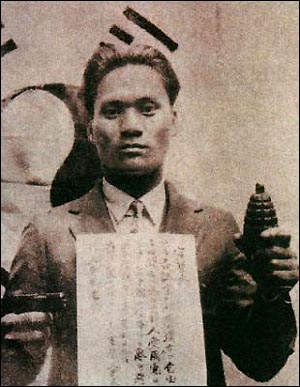Hur Seong-ho, the author of "B.K.Story", the biography of Yoon Bong-gil

WHAT COMES to mind when you hear the name, Yoon Bong-gil? Most students who have lived in Korea might remember the Korean symbolic leader of the independence movement. He is well-known for having thrown the “lunch box bomb” to the Japanese general in Shanghai during the Japanese colonization of Korea. However, the bomb was not actually disguised as a “lunch box,” but as a “water bottle”. Furthermore, there are hundreds of errors in the current biographies and even in the textbooks. Such errors were discovered by Hur Seong-ho (Sr., Dept. of Public Admin.), who wrote the new biography of Yoon Bong-gil, B.K.Story.
The first meeting with Yoon Bong-gil
Since I was six years old my parents have taken me to many Korean independent activists’ birthplaces, as they have a love for our country and the heroes such as Kim Gu and Lee Bong-chang. They struggled for the independence when Korea was under the rule of Japanese imperialism, at the beginning of the 20th century.
I was especially mesmerized by Yoon Bong-gil’s work among them, because I thought the effectiveness of his rebellion was by far the best. Korean independence movement was invigorated and began to receive financial support from the Chinese government after Yoon assassinated Shirakawa, a general of the Japanese Imperial Army, at the bombing attack. I was also impressed by his spirit of sacrifice in that he was sentenced to death only being 25 years old at that time.

Motive for writing B.K.Story
When I was a fourth grader in the elementary school, my homeroom teacher called me as “Little Yoon Bong-gil” because I showed special interest in the hero. Entering middle school, I started to collect historical records including Yoon’s own handwriting, his offsprings and acquaintances in his hometown, Yesan-gun, Chungcheongnam-do.
It was April 2007 when I decided to write a biography of Yoon Bong-gil for myself. I went to a bookstore to buy a kid in my neighborhood Yoon’s biography, but I found over 20 errors in each book introducing Yoon Bong-gil’s life. For nine months, I compared them with my documents and corrected the errors according to the testimonies from other independent activists and the archives of Chinese and Japanese government.
Errors and the facts newly discovered
I found 153 errors and 20 new facts in total while writing the book. All biographies of Yoon ever published explain that he kept silent when arrested by the Japanese policemen. However, in fact, he confused the Japanese government by stating incorrectly that his independence movement was supported by Lee Chun-san, an imaginary person. Thus, he could gain some time for other fellows to escape secretly.
Through my research, I also found some new aspects of Yoon as a labor activiest and a rural activist. He won the reputation of protecting Korean laborers’ right in Shanghai. In his hometown, he was an enthusiastic leader of enlightenment for farmers, believing the farm was “life warehouse”.
Dear Yonseians
As the future leaders of Korea, Yonseians should take the leading role toward making the country worth devoting and sacrificing. Patriotism must not be undervalued by coercion or blind love. It can be instilled into the hearts of people only when the country compensate well enough for the sacrifice like Yoon Bong-gil’s feat. However, Korean leaders today are very poor at dealing with their people and fail to arouse patriotism from them. Therefore, I hope Yonseians do not repeat such mistakes when they lead Korea in the future. I also hope there will be a constant effort to reveal many unknown but great independence activists who have not been treated fairly.

